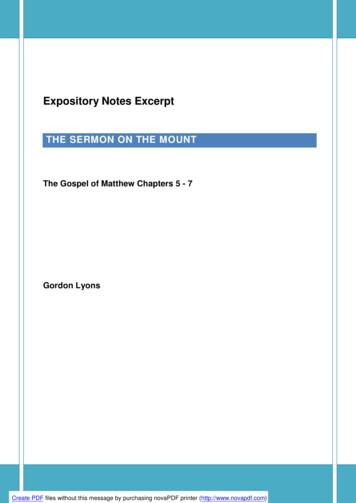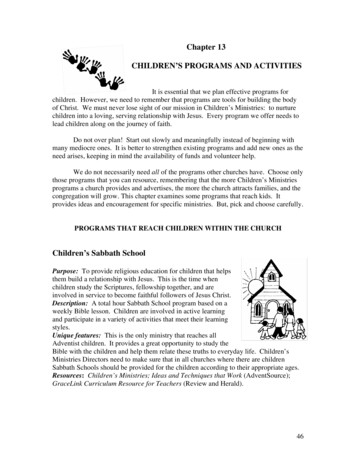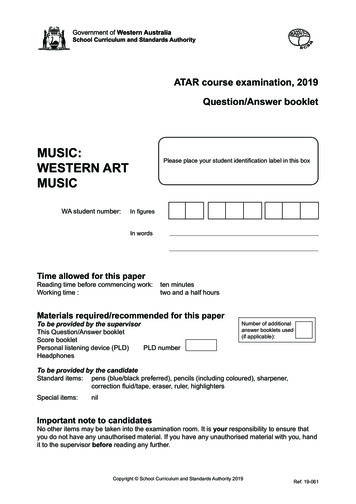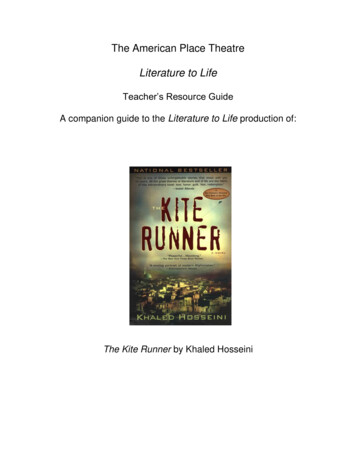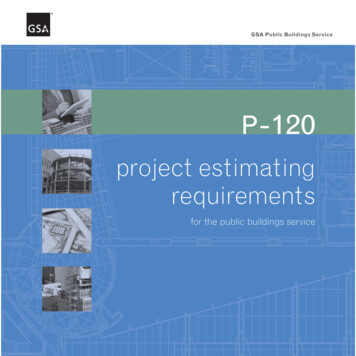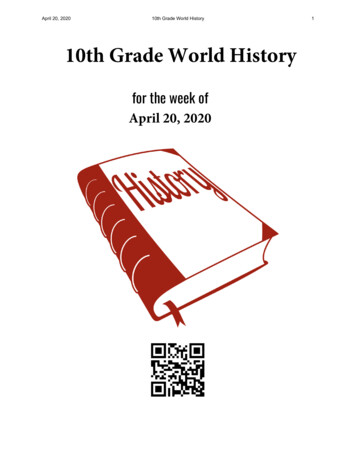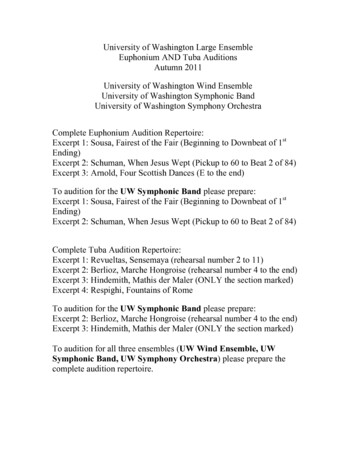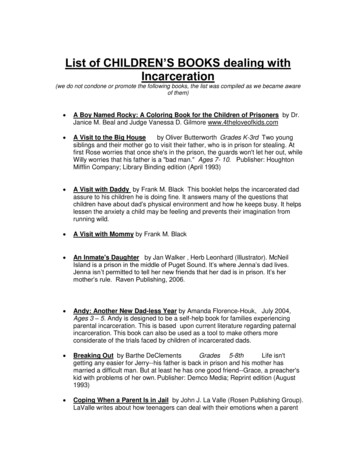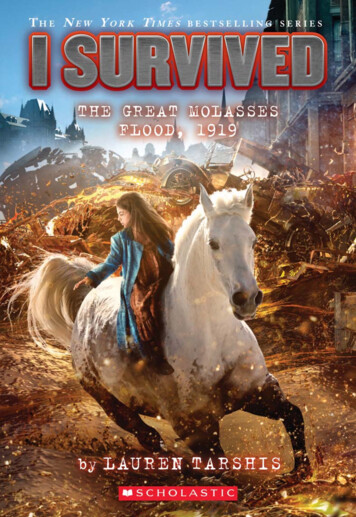
Transcription
If you purchased this book without a cover, you should be aware that thisbook is stolen property. It was reported as “unsold and destroyed” to thepublisher, and neither the author nor the publisher has received anypayment for this “stripped book.”Text copyright 2019 by Dreyfuss Tarshis Media Inc.Illustrations copyright 2019 by Scholastic Inc.Photos : 72: FLHC 4/Alamy Stock Image; 96: Boston Globe/Getty Images;100: FPG/Getty Images; 102: courtesy of the author; 105, 106, 107, 108:Courtesy of the Boston Public Library, Leslie Jones Collection; 113: EngdaoWichitpunya/Dreamstime; 114: Apic/Getty Images; 116: Kirn VintageStock/Getty Images; 117: GL Archive/Alamy Stock Image; 120: The PrintCollector/Alamy Stock Image; 122: PhotoQuest/Getty images.Special thanks to Stephen PuleoThis book is being published simultaneously in hardcover by Scholastic Press.All rights reserved. Published by Scholastic Inc., Publishers since 1920.SCHOLASTIC and associated logos are trademarks and/or registered trademarksof Scholastic Inc.The publisher does not have any control over and does not assume anyresponsibility for author or third-party websites or their content.No part of this publication may be reproduced, stored in a retrieval system, ortransmitted in any form or by any means, electronic, mechanical, photocopying,recording, or otherwise, without written permission of the publisher. Forinformation regarding permission, write to: Scholastic Inc., Attention:Permissions Department, 557 Broadway, New York, NY 10012While inspired by real events and historical characters, this is a work offiction and does not claim to be historically accurate or to portray factual eventsor relationships. Please keep in mind that references to actual persons, living ordead, business establishments, events, or locales may not be factuallyaccurate, but rather fictionalized by the author.ISBN 978-1-338-31741-110 9 8 7 6 5 4 3 2 119 20 21 22 23Printed in the U.S.A.First printing 2019Designed by Katie Fitch40
CHAPTER 1WEDNESDAY, JANUARY 15, 1919AROUND 12:30 P.M.THE NORTH END, BOSTONTwelve-year-old Carmen Grasso was drowning.She was caught in one of the deadliest disastersin the history of Boston. A gigantic wave hadcrashed in to the streets — a swirling, ragingmonster moving faster than a train. It turnedbuildings to rubble. It smashed wagons andmotorcars and tossed trucks into the harbor.1
Twenty-one people would soon be dead. Manymore would be fighting for their lives.This killer wave wasn’t made of water. It didn’tcome from the sea. The monstrous wave wasmade of a thick brown syrup: molasses. For years,millions of gallons of sticky molasses had beenstored in a building-sized metal tank. The hideous tank loomed over Carmen’s neighborhood,blotting out the sun.And in one ear-splitting moment, the molassestank had exploded apart.Carmen and her best friend, Tony, had watchedin horror as the tank began to shake, as itsrounded steel sides bulged in and out. The tankseemed to have come alive, as if it was boilingwith fury, ready to destroy.And then suddenly, thousands of the steel boltsthat held the tank together let go.Bang! Bang! Bang! Bang! Bang!They blasted through the air like bullets firedfrom a machine gun. Seconds later, the metal2
tank blew apart completely. Jagged chunks ofmetal whirled through the air like knife-wingedbirds.The molasses hovered in the air like a black,roiling cloud. And then, with a thundering crash,it hit the ground. Instantly, the streets becameraging rivers filled with wreckage — chunks ofwood and metal and glass, overturned motorcarsand wagons.Horses whinnied in fear.Screams of terror rang out.“Run!”“Get out of the way!”“Help me!”Carmen ran for her life, Tony right behind her.But the wave was moving too fast. Within seconds, the swirl of thick syrup had caught them.The molasses wrapped itself around Carmen’slegs, like millions of powerful snakes drippingwith slime. It rose up to her waist, to her chest.She had to do something!3
And then she saw it: a broken wagon, floatingtoward them. She and Tony both managed toclimb on . . . until a huge hunk of metal from thetank rammed into the wagon.Carmen tried to hold on as the wagon nearlyflipped. But she slipped off and sank into theswirling flood of ooze.“Carmen!” Tony screamed.It was the last sound Carmen heard as themolasses rose up over her head and swallowedher whole.4
CHAPTER 2ALMOST FOUR MONTHS EARLIERFRIDAY, SEPTEMBER 27, 1918AROUND 3:30 P.M.THE NORTH END, BOSTONCarmen and her pal Tony were heading backfrom school, making their way through the noisystreets of their neighborhood, Boston’s NorthEnd. Horse wagons clattered and squeaked, andmotorcars honked. A young newsboy shouted outthe front-page headline.5
“DEADLY FLU HITS BOSTON!”Usually Carmen and Tony would be talkingand joking as they zigzagged their way throughthe packs of people that jammed the street. Theywould maybe stop at Ortelli’s Bakery and see ifthey could sweet-talk Mrs. Ortelli into giving thema free creamy cannoli or crunchy biscotti. Theyalways left empty-handed. But they kept trying,because anything was possible, right?But today Tony was in a rotten mood. Hewalked glumly, skinny shoulders slumped.Carmen had been trying to cheer him up, butnothing was helping.“He hates me,” Tony moaned.“He” was their teacher, Mr. Lawrence.“No, he doesn’t,” Carmen said, for the hundredth time.Mr. Lawrence was the nicest teacher they’dever had. Over the summer, he’d come back fromfighting in the Great War. He’d been badly hurtin a bomb attack, and couldn’t go back into6
battle. So he came home and took a job as ateacher. He had a bad limp, but he acted like itdidn’t bother him.“I’m stupid,” Tony continued.“No, you’re not,” Carmen said, rolling her eyes.How many times had she told him he just had tostudy harder — or maybe open a book for once?That was why Tony flunked the first big mathtest of the year. Carmen knew it wasn’t the F thatupset him; he’d had plenty of those over theyears. It was Mr. Lawrence’s new idea to keepTony in at recess so they could play some mathgames together. Carmen knew Mr. Lawrencewas trying to help Tony.Tony thought Mr. Lawrence was trying to torture him.“That test was impossible!” Tony grumblednow, as they wove around a big pile of horsemanure in the street.“Well . . .” Carmen said.She’d gotten 100, but she hadn’t told Tony that.7
She’d carefully folded the test and slipped it intothe pages of the book Mr. Lawrence had lent toher, The Wonderful Wizard of Oz. The book wasabout a girl named Dorothy who gets sucked intoa tornado and dropped down in a strange landcalled Oz.Carmen couldn’t wait to show the test to Papa.He’d pin her perfect test up on the wall withall the others. Then he’d pat her cheek.“This is why we came here to America,”he’d say.They’d come here four years ago, from a littlevillage in Italy. The village was a beautiful place,where Mama’s and Papa’s families had lived forhundreds of years.But in 1908, when Carmen was two, a powerful earthquake struck the south of Italy. Entirecities turned to dust in the quake. Minutes later,gigantic tidal waves roared across the land. Morethan 100,000 people were killed.8
Including Mama, who was swept away whenthe sea rose up.Carmen had only one memory of that terribleday — dim and hazy like a dream. She wasclinging to Papa’s back as the sea churned allaround them.“Hold on!” Papa had cried. “Hold on!”Papa’s voice had risen above the roaring waves,above the screams of the people all around them.Carmen gripped The Wonderful Wizard of Ozharder as Tony kicked a rotten apple core intothe gutter.Papa never talked about the earthquake. Butgrowing up in Italy, Carmen had heard the stories from her grandmother, Nonna. Andreminders of the disaster were everywhere intheir village — the crumbling church, the ruinedschool, the graveyard where Mama was buried.Papa had wanted to stay in the village. But asthe years crawled by, he realized there was no9
future there, especially for Carmen. The schoolnever reopened, and most girls didn’t go toschool anyway. It was harder and harder for Papato earn money as a farmer.And that’s why, when Carmen turned eight,she and Papa got onto a big ship and came hereto America. They’d begged Nonna to come withthem. But she’d refused.“Someone needs to stay and watch over thisplace, tesoro,” she’d told Carmen. That’s what shecalled Carmen. Her treasure.Carmen hated leaving Nonna. But she’d alwaysbeen curious about that magical land across theAtlantic Ocean: l’America.Carmen had imagined golden streets, skyscraperstopped with rubies, wide-open spaces where sheand Papa would build their new life. Life wouldbe much easier in l’America, she was sure.Carmen smiled to herself now, rememberinghow shocked she was when she and Papa firstarrived here, in the North End. She glanced10
around, flashing back to how all of this lookedthrough her eight- year- old eyes.The sagging buildings. The piles of trash. Thedark alleys filled with howling dogs. She andPapa lived in an apartment so small there wasbarely enough room for the two of them — andthe family of rats that refused to leave.What was Papa thinking? she’d written toNonna. We made a big mistake coming here!11
Why would anyone want to live in l’America?But Nonna wrote her back, telling her to bepatient.Trees don’t grow overnight, she’d said.Why was Nonna writing about trees? Carmenhad wondered. There were hardly any trees inthe North End anyway.But soon Carmen understood what Nonnameant. It took time to get used to a new place.Like trees, she and Papa slowly grew into theirnew lives in the North End. She still missedNonna, of course, more and more, even. Andsometimes Carmen had to escape the crashingnoises and crushing crowds. She’d find a quietspot in her favorite park, close her eyes, and pretend she was back in the village.She’d picture the Italian f lag f lapping in thetown square, with its stripes and shield. Sometimesshe could practically smell the sweet Italianbreezes, a mix of lemons and flowers and the sea.But the North End was her home now. She12
loved school. There was always something newto see in this bustling city. And most of all,she loved their neighbors — Tony and his big,noisy family. They lived in the apartment rightabove them. They’d welcomed Carmen and Papafrom the start. Most nights the delicious smells ofMrs. Grasso’s cooking wafted under their door.And most nights Mrs. Grasso sent one of the kidsdown to invite her and Papa to join them forheaping plates of pasta or bowls of garlicky soupwith chi chi beans.Carmen glanced over at Tony now, smiling toherself. He was more like a brother than a bestfriend. She hated seeing him so sad!But then she had an idea that would definitelycheer Tony up.“Come on,” she said, grabbing his arm. “I’llrace you to the molasses tank!”13
a free creamy cannoli or crunchy biscotti. They always left empty- handed. But they kept trying, because anything was possible, right? But today Tony was in a rotten mood. He walked glumly, skinny shoulders slumped. Carmen had been trying to cheer him up, but nothing was helping. “
